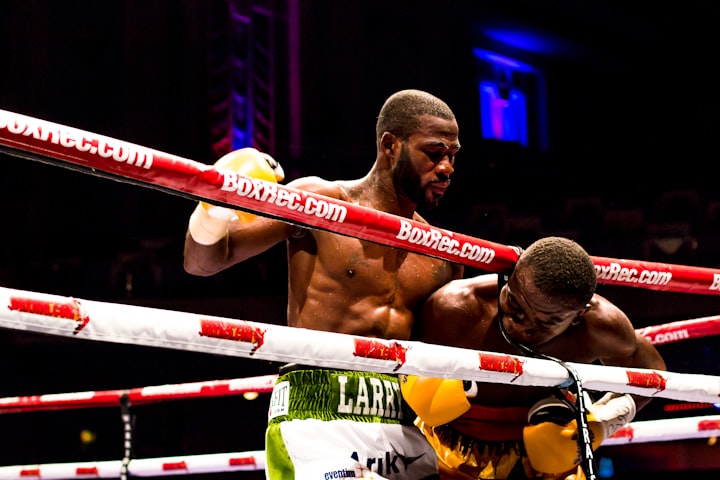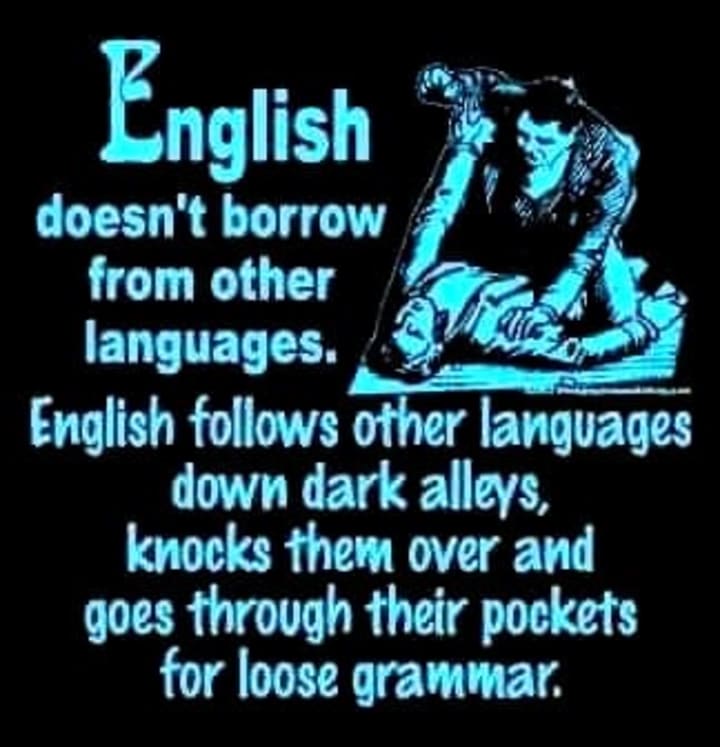Have you squared off with the English vs. American Conundrum?
Are you sure you're ready for this fight?

I’m about to lose my professional demeanor.
Yup. Had enough of holding it in all these years.
I mean whose demeanour is it after all?
Mine.

Though I’ve been quite conflicted for an agonising period of time.
Grrrr!!!
Or is my agony conflicted mid-thought on virtual pages as I type, causing me to question the very things I say so easily, but contemplate conjugations and endings so much now without realizing it (realising it?) when I publish (which I tend to do a lot here lately.)
By now, you might see where I’m going with this.
I can’t be the only one, who after extensive observation and use of the English language, thought what a right royal mess there is with English and American spelling variations.
The Backstory

As easy as falling off a log in primary school. Neighbour and neighbor. Centre and center. Cheque and check. Big whup. English and American versions. Thought that pretty much covered it as far as the rules.
Nope. Not even close.
I didn’t realize it at the time, but there was ninja-style use of American spelling when I reached secondary school, with only a sprinkling of the paltry English variations for seasoning (the perfect setup for a sucker punch later in life.) Nothing rigidly enforced. Just writing out of precepts taught from early childhood, but that wasn’t nearly the whole story.
I grew up in a British Overseas Territory because some hapless English Captain in 1609 shipwrecked on the island’s reefs with settlers bound for the Americas, then was lauded as some kind of victor for his blunder despite the island being previously discovered and named by a Spanish explorer. As a child, I distinctly remember silently resenting the lack of follow-through by the Spaniards so that I could have grown up saying “Gracias a Dios no tengo que aprender ese inglés tan confuso!” “Thank God I don’t have to learn that confusing English!”
The Prologue
In 2015, I began a university course in England, and a gargantuan chasm opened that made neighbor, center, and check look like the drops in the bucket that they actually were.
I had enrolment into a university programme, not enrollment into a university program.
Thinking “Ahh! Predictable pattern, the double consonants for American spelling and single for the English.” Then there would invariably be obtuse flips for 'grueling' as the American variation of the English 'gruelling' which hogged the doubled consonant. Gamboling/ Gambolling (American/English.)
Did anybody think this idiocracy through?
There were 'flautists' opposed to flutists. But 'sulphur' versus 'sulfur?'
I can no longer take you seriously.
Additionally, in secondary school chemistry class it was spelled ‘aluminium’ but pronounced 'aluminum.' The English language was contrary and ornery, yet no one seemed to bat an eyelid.
I discovered -ae and -oe diagraphs that made class writing assignments somewhat of a chore. Now ‘writing’ and ‘chore’ don’t belong in the same sentence for me, so you can imagine the silent angst growing in that interstitial space of dissonance.
I couldn’t write 'anesthetic.' It had to be 'anaesthetic.' And 'dyspnoea' instead of 'dyspnea' when the more important focus was the pre-, peri-, and post-operative care for surgical patients or the fact that a patient had shortness of breath that required monitoring.
And just when I held a glimmer that it could be manageable, I got slammed with 'oedema' instead of 'edema' and I thought to myself,
“WTH! This is beyond stupid!”
The Midpoint
In consideration of the fact that you as a reader may get just as flustered as I do, enjoy some distracting momentary entertainment to ensure that you remain enrapt by words:
And now back to...
The Heat of Battle
Since a great deal of medical terminology was required, I couldn’t avoid it. But at certain points over the course of instruction, part of me gave up caring whether I wrote 'haemotology' or 'hematology' as long as my utilisation/utilization of whatever spelling was consistent.
Then the dissertation rolled around.
The senior dissertation lecturer fielded a question for myself and other overseas students: Standard English spelling was expected in the final written assessment; a make-or-break determiner of degree qualification status.
While I’m grateful that I didn’t have to construct a paper concerning woolly/wooly sheep travelling/traveling down a lacklustre/lackluster country road, driven forward by an elderly moustachioed/mustachioed Welsh gentleman, I still couldn’t help but think, What in the entire eff?!
With an 8,000 word requirement, I would have lost my eternal mind.
My foray into the professional writing arena presented even more glaring disparities, since, in deference, I write spelling-variant consistent to whatever publication I am associating with at the time.
The Root Cause Analysis (so to speak)
I absolutely relish the written word but, “Cómo pasó esto?” “How did this happen?”
The answer has beginnings in two of the first lexicologists of an era, Samuel Johnson and Noel Webster of dictionary fame.
Apparently, Murphy’s Golden Rule didn’t apply here. I guess it was whoever printed and circulated farthest first.
Many of the variations in spelling were not exclusively American standard. Preliminary investigation shows that some so-called American spellings were first used in British literature as with the word ‘favorite’ used in Paradise Lost by John Milton in 1667. And William Shakespeare’s Love’s Labour’s Lost first appeared as Loves Labors Lost in 1598. Shakespeare reputedly preferred the use of 'center' rather than 'centre.' And incidentally, -ize as opposed to -ise endings, have been referenced in English since the 13th century.
The -re and -our endings derived from the French language were the etymological justifications Johnson used for the basis of his dictionary. And since between the 15th – 18th centuries, there was no internationally recognised standard spelling guide (Yeah, I spelled it with an ‘s’ and not a ‘z’— as Garfield would say, “Big fat hairy deal.”), entries were made according to the whim of those who wrote them, and thus we see the root of the confusion.
Webster wanted to simplify written English through phonetics for an America still in early development, hoping to unify its inhabitants and create distance from British English. He reduced the -our to -or and changed -re to -er. Apparently, some of the changes he instituted made it across the pond, (e.g. ‘musick’ became ‘music’) but the modification inroads were limited.

I’m a writer who feels that I inherited the aftermath of bloody unnatural carnage that continues forever without a shred of consideration to service user input or sacrifice in the conflict.
Why does it matter so much what spelling variation I use?
As if it will offend the English word gods and they’ll end all written language in a cataclysmic torrent of destruction.
Does anybody in upper literary echelons notice how completely ridiculous it is when “rules” don’t follow a sensible pattern? Phoney/phony. Aeroplane/airplane.
The Aftermath
Is it not so obviously apparent that in most cases there's not one iota-of-difference in pronunciation regardless of how you spell it?
And then I’m left with a powerful word like 'maneuver' which of course becomes 'manoevre' in Britain, and the awkward conjugations begin… It’s 'manoeuvred' or 'manoeuvring' as a verb tense and 'manoeuvrable' and 'manoeuvrability' as adjective and noun respectively. Now I just don’t want to use the word anymore and find a synonym less complicated and labor-intensive when all I want to do is guide an object around friggin’ obstacles.
So when I travel from place to place in the UK, and words like 'tyre' and 'fayre' pop up everywhere, which I definitely saw neither hide nor hair of when I was practising for spelling tests in school, I have to wonder WHHHHYYYYYY is this continuing business as century after century usual?”
While working on a fiction piece, I realised I’d crossed the edge when 'jewelry' confused me with 'jewellery' and I couldn’t take it another cotton-picking minute. Even if I’m a lone voice buried amidst the cacophony of global din, I needed to say it.
Yes, by golly there are more important issues right now, and this barely registers as a first-world problem, but I will write my disdain.

I’ve never been consulted over modifications to the only language I communicate in. Nor have I previously expressed how unfair, illogical, and archaic the journey is for writers to find comfortable functionality and plain common sense in execution.
Communication in all of its forms is a global thread. Is it really asking too much for the English language to have either more spelling coherence or acceptable variance without restrictions/repercussions, actual or inferred, in real-life practical application?
Por qué no? Why not?
English siphons/syphons from so many other languages. Why can’t it step up to the plate and pull its own weight for once?

I really appreciate the fact that you read this all the way to the end. I know, I know, that was some mini-rant. There are plenty of other written pieces where I don't rant. Honest. Have a look:-
Please know that while tips are encouraging and highly valued irrespective of the amount, so is liking and sharing my work to increase my readership. I'm just so overjoyed that my work is being read!
I welcome your questions, comments, and feedback @thedaniwriter
About the Creator
Reader insights
Outstanding
Excellent work. Looking forward to reading more!
Top insight
Expert insights and opinions
Arguments were carefully researched and presented






Comments (1)
Well done! Loved it!